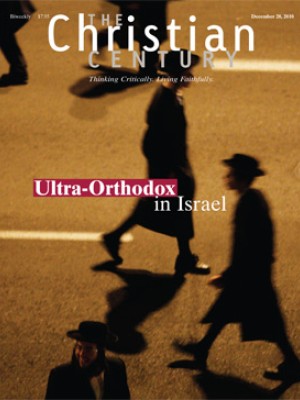Top religion news in 2010 evoked sense of déjà vu
The calendar may have said 2010, but for Pope Benedict XVI and much of his global flock, it looked and felt a lot like 2002.
For
the second time in a decade, damning charges of child molestation at
the hands of Catholic priests dominated headlines, this time reaching
the highest levels of the Vatican, as critics questioned whether
Benedict himself mishandled abuse cases.
The Roman Catholic Church
wasn't the only institution battling a sense of déjà vu, as some of the
most controversial religion stories from the past 20 years returned to
the headlines.
A 1994-style fight over health-care reform not only
pitted Republicans against Democrats but also Catholic bishops against
Catholic nuns. Lingering questions about President Obama's Christian
faith morphed into a belief among one in five Americans that he's
actually a Muslim. Nearly ten years after 9/11, Islamophobia returned
with a vengeance as a Florida pastor threatened to torch a pile of
Qur'ans, and Tennessee officials debated whether Islam is actually a
religion.
Read our latest issue or browse back issues.
This time, the resurrected stories were more pointed,
the debates more polarizing. Old stories found new life online, and
voices that once would have been dismissed as extreme were amplified by
the Internet, Facebook and Twitter.
"New media have had the effect
of keeping certain news stories alive, bringing them back from the dead
and propelling them into the news," said Diane Winston, a scholar of
religion and media at the University of Southern California.
The
2010 abuse scandal, unlike the 2002 crisis in the U.S., was largely
confined to Europe, starting in Ireland and later erupting in the pope's
native Germany. Four bishops resigned, and Benedict ended the year by
telling cardinals that worldwide guidelines for handling abuse cases
will be forthcoming.
"It was really almost like the crater of a
volcano, out of which suddenly a tremendous cloud of filth came,
darkening and soiling everything," the pope told a German journalist in a
book based on six hours of interviews in July.
[Vatican's
official newspaper leaked excerpts in which the pope suggested that
condoms might sometimes be justified in reducing the spread of HIV/AIDS.
Benedict said that a male prostitute, for example, is someone whose use
of a condom "can be a first step" in the practice of sexual morality.]
Here
at home, the ghosts of 9/11 loomed large as a fight over a planned
Islamic community center a few blocks from Ground Zero became a litmus
test for tolerance toward American Muslims. Evangelist Franklin Graham
was disinvited to a National Day of Prayer event at the Pentagon for
calling Islam an "evil" and "wicked" religion—comments he made back in
2001.
Even as Michigan's Rima Fakih was crowned the first Muslim
Miss USA, 53 percent of Americans admitted harboring unfavorable views
of Islam. Oklahoma voters passed a preemptive ban on judges using
Islamic law in state courts, although a judge put a restraining order on
its enactment.
Omid Safi, a professor of Islamic studies at the
University of North Carolina at Chapel Hill, said he is most concerned
by the reaction against the organizers of Park51, the proposed Islamic
center near Ground Zero. "This is the most interfaith-y group of Muslims
imaginable," he said. "They are as successful an American story as it
gets; it's the perfect immigrant narrative. These are people who get
sent by the State Department overseas to say Muslims can live freely in
this country, and then they are caricatured as jihadist radicals."
Distrust
of Islam was not limited to American shores. A year after Switzerland
banned minarets at mosques, Belgium and France banned Muslim women from
wearing full-face veils in public.
Like the 1994 Republican
resurgence, the Democrats' midterm "shellacking" was fueled in large
part by anger over health-care reform. The plan split American
Catholics, with bishops opposing it and Catholic hospitals and nuns
supporting it. The hierarchy later dismissed the dissenters' support for
the plan as mere "opinion," however "well considered."
In
Episcopal Church ranks, it felt a lot like 2003 again as Mary Glasspool
was elected the church's second openly gay bishop. New Hampshire bishop
V. Gene Robinson, whose 2003 election sparked a global schism, announced
that he will retire in 2013. Glasspool's election prompted Anglican
leaders in London to sideline their rebellious American branch on some
international panels.
For the fourth time in nearly a dozen years,
the Presbyterian Church (U.S.A.) General Assembly voted (373 to 323) to
ask its regional presbyteries to lift a ban on partnered gay clergy.
Similar proposals have failed in the past, though the defeats have grown
narrower each time.
A rash of teen suicides and gay bullying
spurred religious leaders, rock stars and even Obama to join the "It
Gets Better" project, while an October poll found that two-thirds of
Americans see a link between religious teachings against homosexuality
and higher rates of suicide among gay youths.
Religious teachings
against homosexuality are not enough to justify a ban on gay marriage, a
federal judge ruled in August in striking down California's Proposition
8. And religious beliefs are not enough to justify the unconstitutional
law that created the National Day of Prayer, another federal judge
ruled in April.
Pioneering televangelist Robert Schuller, after a
bitter and public family feud, handed his Southern California pulpit
over to daughter Sheila Schuller Coleman, who filed for bankruptcy in
October, citing church debts of $43 million.
Religious and
humanitarian groups rallied to deliver relief to earthquake-ravaged
Haiti, where an estimated 220,000 died, more than 300,000 were injured
and more than 1 million were left homeless. Ten U.S. missionaries were
temporarily detained on charges of trying to smuggle Haitian orphans out
of the country.
And along the Gulf Coast, social service agencies
were stretched thin trying to deliver relief to families and businesses
struggling to cope with the massive BP oil spill. —RNS





